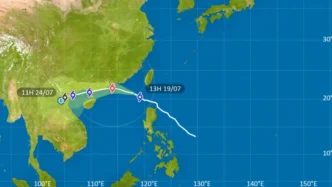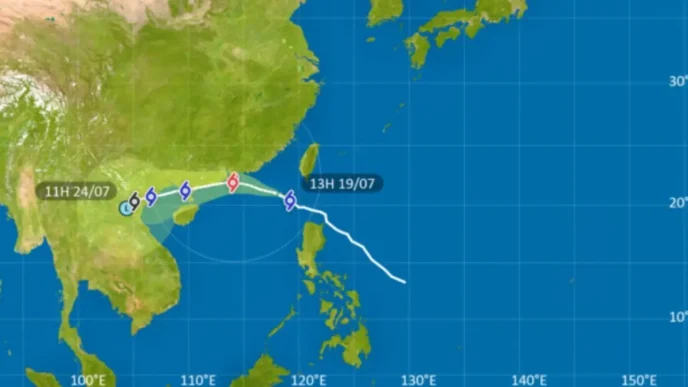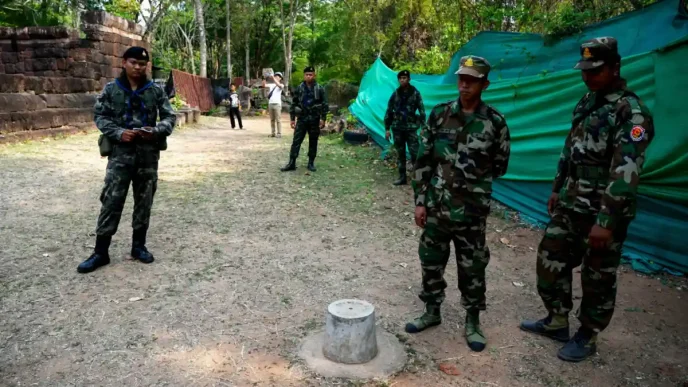A beauty pageant meant to foster global harmony has instead ignited a firestorm of protest, with Vietnamese fans expressing fierce indignation over a graphic displayed during the Miss Global 2025 final competition. The image, shown during the event held on Sunday night at the Mall Lifestyle Ngamwongwan in Nonthaburi, Thailand, depicted China’s controversial “10-dash line,” a territorial claim that encroaches on areas Vietnam asserts as its own in the South China Sea. The incident has reopened wounds over one of the region’s most contentious geopolitical disputes, drawing attention to the delicate balance between cultural events and political sensitivities.
The uproar was so intense that the Miss Global Organization issued a public apology on social media while the competition was still underway. “We sincerely apologize for any offense caused by the graphic material we recently shared. It was never our intention to misrepresent or disregard Vietnam’s sovereignty or the sensitivities surrounding territorial matters,” the statement read. The organizers further pledged to exercise greater caution in selecting visual content, acknowledging the historical and national significance of such issues.
While the graphic also overlapped with the Philippines’ exclusive economic zone (EEZ), the reaction from Filipino netizens was notably muted in comparison to the vocal outrage from Vietnamese fans. The incident has once again spotlighted the long-standing territorial disputes in the South China Sea, where China’s expansive claims—covering roughly 90% of the strategic waterway—conflict with those of Vietnam, the Philippines, Malaysia, Brunei, and Indonesia.
A History of Cartographic Contention
China’s “10-dash line,” an extension of the earlier “nine-dash line” submitted to the United Nations in 2009, has been a persistent source of tension in the region. The latest iteration, introduced in a 2023 map, includes a broader geographical scope and incorporates Taiwan, echoing a 1948 map of China’s territorial assertions. The line stretches as far as 1,500 kilometres south of China’s Hainan Island, cutting deep into the EEZs of neighbouring states. In 2023, Vietnam, the Philippines, Malaysia, and Taiwan collectively rejected the map as baseless, underscoring the deep divisions over sovereignty in the South China Sea.
The waterway is not just a geopolitical flashpoint but also a vital economic corridor, with an estimated $3.4 trillion in annual trade passing through its waters. It is rich in fisheries and believed to hold significant untapped oil and gas reserves, making control over the region a high-stakes issue for all claimant states. For Vietnam, the dispute is particularly emotive, tied to national identity and historical resistance against external influence. Public sentiment often flares when perceived slights to sovereignty occur, as seen in the Miss Global controversy.
The use of such a graphic in a high-profile international event like Miss Global raises questions about the intersection of politics and popular culture. Beauty pageants, often marketed as celebrations of unity and “world peace,” are not immune to the undercurrents of geopolitical strife. This incident recalls similar controversies, such as the 2019 Miss Universe pageant, where national costumes and statements occasionally sparked debates over political messaging.
Vietnamese Fury and a Crowning Triumph
The backlash from Vietnamese fans was swift and unrelenting, flooding the Miss Global Organization’s social media pages with criticism. Many viewed the graphic as a direct affront to Vietnam’s sovereignty, a sentiment amplified by the country’s historical tensions with China over the Paracel and Spratly Islands in the South China Sea. Online comments ranged from calls for a boycott of the pageant to demands for greater accountability from international organizations hosting events in the region.
Yet, amidst the controversy, there was cause for celebration in Vietnam. The night culminated in a victory for Miss Vietnam, Nguyen Đình Nhu Vân, who was crowned Miss Global 2025, besting 61 competitors from around the world. Her win, succeeding Puerto Rico’s Ashley Melendez from the 2023 edition, offered a moment of national pride and shifted the narrative from outrage to jubilation for many Vietnamese fans. Nguyen’s triumph underscored the resilience of the Vietnamese spirit, turning a night of contention into one of victory.
The Philippines also had a strong showing, with Mutya ng Pilipinas Xena Ramos placing as fourth runner-up in the top five. Speaking to the Inquirer after the event, Ramos expressed gratitude for the opportunity to represent her country on the global stage. “It’s a blessing for me to be able to wave the flag on the international stage. And I couldn’t be any more grateful. I’m happy to have contributed something for the country,” she said. The Philippines has a storied history in the Miss Global pageant, with Shane Tormes clinching the title in 2022 during the contest’s ninth edition in Indonesia.
Broader Implications of the Dispute
The Miss Global incident is a microcosm of the broader challenges facing South East Asian nations as they navigate their relationships with China and each other. Vietnam’s vocal response reflects a growing assertiveness in defending its territorial claims, a stance mirrored by the Philippines under President Ferdinand Marcos Jr., who has publicly questioned China’s “10-dash line.” However, the disparity in public reaction between Vietnamese and Filipino audiences during the pageant highlights differing national priorities and levels of engagement with the issue.
For Vietnam, the South China Sea dispute is not merely a matter of territory but a symbol of national sovereignty and resistance against historical domination. Public outrage over perceived encroachments often serves as a rallying point, galvanizing both citizens and policymakers. In contrast, while the Philippines has pursued legal avenues—most notably through the 2016 Arbitral Tribunal ruling that invalidated China’s expansive claims—domestic discourse on the issue can be overshadowed by other pressing concerns such as economic challenges and internal politics.
The muted Filipino reaction to the Miss Global graphic may also reflect a broader desensitization to the dispute, given the frequency of incursions into the country’s EEZ by Chinese vessels. While Vietnamese indignation was amplified by a sense of immediacy and cultural affront, Filipino netizens appeared less mobilized, with only a handful taking to social media to express discontent. This divergence underscores the complex interplay of national identity, historical context, and public engagement in shaping responses to regional disputes.
Cultural Events as Political Battlegrounds
The controversy at Miss Global 2025 serves as a reminder that cultural and sporting events are increasingly becoming arenas for geopolitical expression. From the Olympics to international pageants, symbols and representations carry weight far beyond their immediate context. Organizers of such events must tread carefully, particularly in regions like South East Asia, where historical grievances and territorial disputes simmer beneath the surface of public discourse.
The Miss Global Organization’s swift apology indicates an awareness of the potential fallout from such missteps. However, it also raises questions about accountability and due diligence in curating content for international audiences. The graphic’s inclusion—whether accidental or otherwise—suggests a lack of sensitivity to the region’s political fault lines, a miscalculation that could have lasting repercussions for the pageant’s reputation in Vietnam and beyond.
Moreover, the incident highlights the power of public sentiment in the digital age. Social media platforms have become amplifiers of national outrage, enabling rapid mobilization of opinion and placing pressure on organizations to respond in real time. For Vietnamese fans, the online backlash was not just a reaction to a graphic but a broader assertion of national pride and sovereignty—a digital echo of street protests that have historically accompanied South China Sea disputes.
Looking Ahead: Diplomacy and Dialogue
As the dust settles on the Miss Global controversy, the incident offers a moment for reflection on how cultural exchanges can either bridge divides or deepen them. For South East Asian nations, the challenge lies in balancing national interests with the need for regional cooperation. The South China Sea remains a flashpoint, with no immediate resolution in sight despite ongoing diplomatic efforts through frameworks like the Association of Southeast Asian Nations (ASEAN).
If anything, the pageant uproar underscores the importance of dialogue and mutual understanding in addressing territorial disputes. While beauty contests may seem trivial in the grand scheme of geopolitics, they can serve as unexpected catalysts for broader conversations about sovereignty, identity, and respect for national boundaries. For now, Nguyen Đình Nhu Vân’s crowning as Miss Global 2025 offers a silver lining for Vietnam—a reminder that even in moments of contention, there can be cause for celebration.
The Miss Global Organization, meanwhile, faces the task of rebuilding trust with its Vietnamese audience. Its apology is a start, but future actions—such as greater cultural consultation and transparency in content selection—will be critical in preventing similar controversies. In a region as politically charged as South East Asia, even the smallest misstep can have outsized consequences, turning a stage meant for unity into a platform for division.














